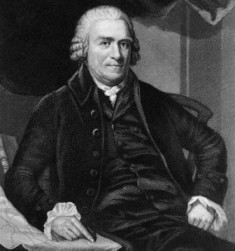
Where did Samuel Adams grow up?
Samuel Adams grew up in the city of Boston in the colony of Massachusetts. His father, Samuel "Deacon" Adams, was a political leader, a staunch Puritan, and a wealthy merchant. Samuel learned a lot about politics, the rights of the colonies, and religion from his parents.

Samuel Adams by Major John Johnston
Education and Early Career
Samuel learned to read and write as a young child from his mother Mary. He then attended the Boston Latin School. He was an intelligent student and loved to learn. At the age of fourteen Samuel entered Harvard University where he studied politics and history. He graduated with a master's degree in 1743.
Adams began his career in business. His father loaned him some money to start his own business, but Samuel lent half of it to a friend. He soon was out of money. He took a job working for his father, but he had little interest in business or making money.
The Sons of Liberty
When the British government passed the Stamp Act of 1765, Adams became angry that the king would tax the colonies without offering them representation in the government. He began to organize protests against the king and the taxes. He formed a group of patriots called the Sons of Liberty.
The Sons of Liberty became an influential group in organizing the patriots against the British. Early on they protested the Stamp Act by hanging a dummy of a British Tax Agent and throwing rocks through the windows of the tax collector's house. They were also involved in the Boston Tea Party.
The Sons of Liberty movement spread throughout the colonies. The group in New York City was especially strong and used violent protests to scare loyalists during the Revolutionary War.
Political Career
Adams was elected to the Massachusetts Assembly in 1765. He helped to organize the Stamp Act Congress held in New York where the colonies planned a unified response to the Stamp Act. After the Boston Massacre occurred in 1770, Adams worked to get the British army removed from the city. He also organized a way for patriots throughout the colonies to communicate with each other.
Boston Tea Party
Even though the Stamp Act was repealed in 1766, the British government continued to impose taxes on the American colonies. One tax was on tea imported into the colonies. On December 17, 1773 Adams gave a speech to a number of patriots and members of the Sons of Liberty. The people had demanded that the British ships carrying tea in Boston Harbor leave, but the British refused. Later that night, a number of Bostonians boarded the ships and dumped their tea into the harbor.
Revolutionary War
Adams was selected to represent the Massachusetts colony at the First Continental Congress in 1774. They gathered to send a letter to King George III in protest of the taxes. They also planned to meet again.
Patriots throughout the colonies began to gather weapons. In Massachusetts, Adams helped to organize the minutemen, a group of militia that was ready to fight at moment's notice.
Battles of Lexington and Concord
In April of 1775, the British army set out to march to Concord, Massachusetts in order to destroy patriot weapons that were stored there. They also were going to arrest the patriot leaders Samuel Adams and John Hancock. Adams and Hancock were warned by Paul Revere after his daring ride. They managed to escape capture, but the Revolutionary War had begun.
Declaration of Independence
Adams attended the Second Continental Congress in 1776 where he signed the Declaration of Independence. He also helped to write the Articles of the Confederation.
After the Revolutionary War
After the war, Adams continued to be involved in politics. He served as a state senator, then as lieutenant governor, and finally as governor of Massachusetts. Adams died at the age of eighty-one in 1803.
Learn more about the Revolutionary War: